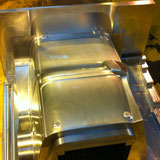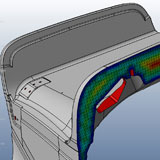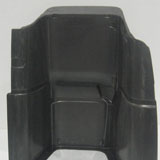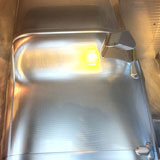



 Design collaboration = tooling 'right first time'
Design collaboration = tooling 'right first time'
Devon based DeltaCAD Ltd, a start-up company who specialise in CADCAM services has recently collaborated with sub contract tooling manufacturer Casting Support Systems Ltd on a project to provide a leading Aerospace company with aluminium tooling for a carbon composite seat shell for a major civil airline company. The volatile nature of fuel prices has forced the aerospace industry to make weight reduction a high priority focus and reducing the weight of aircraft seating significantly reduces aviation fuel consumption and CO2 emissions throughout the operational lifetime of the aircraft, with every kilogram of weight contributing to the running costs of an aircraft to the carrier.
DeltaCAD Ltd was founded in 2010 by Dean Challis, a design engineer with considerable CADCAM and tool design experience, who provides a comprehensive range of design and manufacturing services from 2D drawings to 3D modelling and CAM programming.
"The combination of Dean and VISI has catered for many additional requirements and has in fact exceeded our expectations. Vero have provided a powerful, cost effective solution for the design and manufacture of complex tooling.”
James Head
For this project, the original CAD model was provided by the customer as a Unigraphics NX file and the part analysis and tool design was performed using VISI Modelling from Vero Software. "VISI is very tolerant of non-native data", explains Dean Challis. "Often when models are originally designed, the manufacturing requirements are not always known. To make a part manufacturable, it is vital to interact with the data and make the relevant changes. In regards to these particular components and with authority from the original design team, the tooling was modified to remove undercut areas and apply blend radii on sharp edges. Typically, blending can be a very complex task and it is often necessary to explode a model into surfaces and manually apply the CAD modifications. VISI is very strong at switching between a solid & surface environment and this allows us to make complex changes where other CAD systems often fall over."
The manufacture of the tooling was performed by Casting Support Systems Ltd, a company who supply large tooling to the Investment Casting, Plastic moulding and Gas Turbine Industries; but also, in conjunction with its sister company Versa-tote, is a forerunner in the design and manufacture of returnable transit boxes, picking and order tote boxes for distribution and storage facilities across Europe.
All toolpaths were programmed using VISI Machining and the aluminium tooling was milled using XYZ 1060 high speed vertical machining centres running Siemens 840D ShopMill Control, with WNT solid carbide end mills which have been specifically designed for cutting softer materials such as aluminium. The geometry of the tooling makes it possible to cut full slots to 1.5 x D depth with high feed rates, typically twice that of traditional steel cutting tools. The tooling life for the cutters is approximately 3,000 hours.
The entire multi surface tool was manufactured and assembled in only 9 days and this was partly due to optimal toolpath usage and running multiple jobs at the same time. Sam Cox, Tool room foreman at Casting Support Systems explains, "Complex tools often contain a number of sub inserts where the setup time is disproportionate to the actual CAM runtime. To overcome this obstacle, we setup a number of individual jobs located around a single datum which run overnight for lights-out machining. Although the machine can run at optimum production rates, we back off when running overnight to protect tool life. We use VISI to accurately predict the actual toolpath cutting time and program accordingly. A typical set of overnight programs will run for up to 14 hours."
The carbon fibre material used was a 2 x 2 twill weave cloth that is pre-impregnated with epoxy resin so that when the tool is brought up to temp (120-140 degrees depending on resin used) the resin cures within approximately 1 hour. The tool is then cooled as quickly as possible and the top half of the tool is removed, exposing the carbon fibre moulding. The properties of carbon fibre such as high tensile strength, low weight, and low thermal expansion make it very popular in aerospace, civil engineering, military, and competition sports.
The complete assembled, multi insert tooling was sent to our customer for lay-up and production where the final carbon fibre component (measuring 700mm x 680mm x 460mm) weighed only 5.25 lbs was 'right first time having virtually no visible split line definition'.
Although Casting Support Systems Ltd already have in-house CADCAM capabilities, Director, James Head acknowledges the benefits of using external design expertise from DeltaCAD and maximising the use of VISI Machining. "The combination of Dean and VISI has catered for many additional requirements and has in fact exceeded our expectations. Vero have provided a powerful, cost effective solution for the design and manufacture of complex tooling."
About The Company:
Name:DeltaCAD Ltd
Web: www.deltacad.co.uk
Benefits Achieved:
- Tolerant solid / surface environment for non-native CAD data
- Accurate part analysis at the design stage
- VISI Machining & XYZ 1060 VMC for safe, consistent, lights-out machining
"The combination of Dean and VISI has catered for many additional requirements and has in fact exceeded our expectations. Vero have provided a powerful, cost effective solution for the design and manufacture of complex tooling.”
James Head





